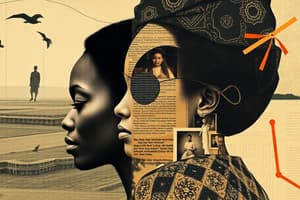Podcast
Questions and Answers
What concept does the speaker believe is closely related to power?
What concept does the speaker believe is closely related to power?
Why does the speaker suggest engaging with all stories of a place or person?
Why does the speaker suggest engaging with all stories of a place or person?
What example does the speaker use to demonstrate the negative impact of a 'single story'?
What example does the speaker use to demonstrate the negative impact of a 'single story'?
What motivated Muhtar Bakare to start a publishing house?
What motivated Muhtar Bakare to start a publishing house?
Signup and view all the answers
What does the speaker emphasize as the importance of stories?
What does the speaker emphasize as the importance of stories?
Signup and view all the answers
Which American writer is mentioned in the text as an example of the power of storytelling?
Which American writer is mentioned in the text as an example of the power of storytelling?
Signup and view all the answers
What inspired Chimamanda Ngozi Adichie to write stories with white and blue-eyed characters?
What inspired Chimamanda Ngozi Adichie to write stories with white and blue-eyed characters?
Signup and view all the answers
What did Chimamanda Ngozi Adichie realize about her identity as an African during her time in the United States?
What did Chimamanda Ngozi Adichie realize about her identity as an African during her time in the United States?
Signup and view all the answers
Who is mentioned as one of the early European travel writers responsible for portraying Africa negatively?
Who is mentioned as one of the early European travel writers responsible for portraying Africa negatively?
Signup and view all the answers
Why did Chimamanda Ngozi Adichie's novel receive criticism for 'lacking African authenticity'?
Why did Chimamanda Ngozi Adichie's novel receive criticism for 'lacking African authenticity'?
Signup and view all the answers
What realization did Chimamanda Ngozi Adichie have about the power of stories in shaping perceptions?
What realization did Chimamanda Ngozi Adichie have about the power of stories in shaping perceptions?
Signup and view all the answers
What effect did Chimamanda Ngozi Adichie's visits to Fide's village have on her perspective?
What effect did Chimamanda Ngozi Adichie's visits to Fide's village have on her perspective?
Signup and view all the answers
Study Notes
- The speaker, Chimamanda Ngozi Adichie, grew up in Nigeria and was an early reader and writer.
- She spent her childhood reading British and American children's books, which inspired her to write stories with white and blue-eyed characters.
- She discovered African literature as a teenager and it broadened her perspective on what fiction could be about.
- When she was eight years old, her family hired a new houseboy named Fide, and she had a limited understanding of his background.
- When she visited his village, she was amazed to see the beautiful crafts his family made despite their poverty.
- Later, when she went to university in the United States, she experienced being stereotyped as an African woman and felt pity from her roommate and others.
- She realized that her roommate and others had a "single story" of Africa as a place of poverty, catastrophe, and helplessness.
- She also came to understand that her own identity as an African was shaped by these stereotypes, which she had internalized.
- The tradition of telling African stories in the West as negative and different begins with European travel writers like John Lok.
- She experienced the power of these stories firsthand when her novel was criticized for lacking "African authenticity."
- She also recognized the power of these stories in shaping her own perceptions of other peoples and cultures, such as Mexicans.
- She believes that the principle of "nkali," or the ability to tell another person's story and make it definitive, is closely tied to power.
- She gives the example of how starting the story of the Palestinian-Israeli conflict with the arrows of the Native Americans instead of the arrival of the British would change the narrative.
- She encourages readers to be aware of the power dynamics that shape the stories we tell and believe about other people and cultures.- The speaker grew up in a happy childhood in a close-knit family, but also experienced hardships such as grandfathers dying in refugee camps, lack of adequate healthcare, and political fear under repressive governments.
- The speaker argues against the "single story" of Africa, which focuses only on catastrophes and ignores other stories, stating that it robs people of dignity and makes it difficult to recognize our equal humanity.
- The speaker suggests engaging with all stories of a place or person for proper understanding.
- The speaker's Nigerian publisher, Muhtar Bakare, defied conventional wisdom and started a publishing house, believing that people who could read would read if literature was affordable and available.
- The speaker recounts a Nigerian woman who read and provided suggestions for a sequel to one of her novels, showing that ordinary Nigerians are avid readers despite stereotypes.
- The speaker highlights various Nigerian stories, including a female lawyer challenging a ridiculous law, contemporary Nigerian music, and innovative filmmakers in Nollywood.
- The speaker and her publisher have started a non-profit, Farafina Trust, with big dreams of building libraries, refurbishing existing ones, and organizing workshops for aspiring writers.
- The speaker emphasizes the importance of stories in empowering and humanizing individuals and communities.
- The American writer Alice Walker's experience of reintroducing her Southern relatives to their past through a book serves as an example of the power of stories to regain paradise.
Studying That Suits You
Use AI to generate personalized quizzes and flashcards to suit your learning preferences.
Description
Learn about Chimamanda Ngozi Adichie's upbringing in Nigeria, her experiences with stereotypes, the impact of single narratives on perceptions, and the power of storytelling to shape human understanding and identity.




